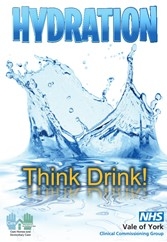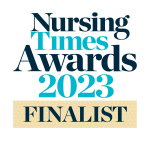Improving Hydration in Care Home Residents


As part of our commitment to supporting independent care providers the nursing team are leading on a quality improvement programme aimed at reducing the incidence of E.Coli bacteraemia across North Yorkshire and York care services.
Literature acknowledges poor hydration as a major contributory factor to a higher rate of E.coli bacteraemia across the locality, and with this in mind, the team will be embarking on a programme of work working with care staff to focus on supporting optimum hydration in residents of care homes. The team recognise many homes already have innovative ways of working to help support residents with their drinking, homes will be approached by the nursing team with the offer to participate should they wish.
The programme will involve face to face training and the use of workbooks to explore ways of improving service user hydration. As part of the project care homes will be supported to evaluate their current hydration assessment and monitoring tools and progress improvements where appropriate. The training includes good continence care, catheter hygiene and includes advice around the 'No Dip' principles for testing urine in suspected UTI.
Through improving recognition and response to hydration needs of residents in care homes, it is anticipated that the following outcomes might be achieved:
- Reduce avoidable harm caused through poor hydration
- Enhance clinical outcomes (reduce need for antimicrobial treatment, hospital conveyance/ admissions)
- Improve experience for residents in care homes
- Improve staff experience/ safety culture
- Improve antimicrobial stewardship
The work has a number of drivers to help achieve the strategic aim. Please below a driver diagram to provide with you an overview of the work and also an example of the resources produced which will support care staff in developing understanding in relation to hydration.
- Driver Diagram
- Hydration Programme Leaflet
- Hydration Programme Workbook
- Hydration Pocket Card
- Hydration training slides
In October 2023, The Improving Hydration Programme was a finalist in the Nursing Times Awards in the Nursing in Social Care Category in recognition of innovative, patient centred and inclusive working to support providers and those in their care across North Yorkshire and York.
International Nutrition and Hydration Week
In March we marked International Nutrition and Hydration Week, as an opportunity to highlight the importance of positive nutritional and fluid intake to the health and wellbeing in our care. It was also a chance for providers to organise their own events and activities to raise awareness and to celebrate the creativity of our care teams in supporting the nutrition and hydration of their residents. We've had an incredible response and have put together a summary showing how our care providers took part in the week, which includes lots of great ideas that other providers can take away and use in their settings. The week saw everything from mocktail tasting evenings to residents and staff cooking up some tasty and nutritious treats together, and from fun quizzes to amazing tea parties. To see how everybody got on then please follow this link.
If anyone would like to be involved, or if there are any questions, please contact hnyicb-voy.yorkplacequalitynursingteam@nhs.net
Other Care Provider pages
- Recognising and Responding to Deterioration in Residents
- React to Red
- React to Falls Prevention
- Hand Hygiene and PPE
- Oral Health training
- Nutrition
- Partners in Care Prompt and Information Cards
- Digital Care Telemedicine Service for Care Homes
- Capacity Tracker
- Conferences and Webinars
- Care Connected
- Partners in Care Bulletins
- North Yorkshire and York Care Provider Olympics
- Alerts for Care Providers
- PERSON Approach
- Useful links and resources
- Student Placements
- Registered Nurses in Social Care
- Research



